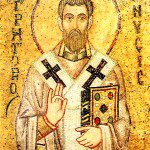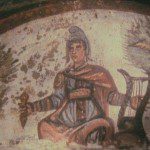They said that a certain old man asked God to let him see the Fathers and he saw them all except Abba Anthony. So he asked his guide, “Where is Abba Anthony?” He told him in reply that in the place where God is, there Anthony would be.[1]
![Scenes from the life of Anthony; Vitale da Bologna [Public domain], via Wikimedia Commons](https://wp-media.patheos.com/blogs/sites/637/2016/12/Vitale_da_Bologna_14e_eeuw_-_Vier_verhalen_van_Antonius_van_Egypte_1340_-_Bologna_Pinacoteca_Nazionale_-_26-04-2012_9-22-59-139x300.jpg)
While there were many ascetics, like St. Paul the Hermit, and many others forming monastic communities, like St. Pachomius, it was Anthony more than any other who inspired so many to enter the desert and turn it into a city of God, and this was happening before the conversion of St. Constantine (showing that, contrary to popular opinion, monasticism itself was not merely reaction against the perceived laxity of converts thanks to the Christianization of the empire). St. Athanasius beautifully presented, in the life of Anthony, how the monastic community grew and became a new spiritualized community set apart from the world by its religious fervor:
So their cells were in the mountains, like filled with holy bands of men who sang psalms, loved reading, fasted, prayed, rejoiced in the hope of things to come, laboured in almsgiving, and preserved love and harmony one with another. And truly it was possible, as it were, to behold a land set by itself, filled with piety and justice.[2]
The early monks and nuns (all which were called monks), could even be seen like a band of holy highway robbers hiding out in the wilderness; but instead of seeking wealth from passersby, they waylaid the demons and gave the fruit of their victory back to the general populace. They sought a communion of love, following the example of the first Christian community described in the Book of Acts, though their form of life was different, because they went into the desert to directly take on the fight against the spiritual powers and principles which hindered them – and the rest of humanity – from achieving God’s plan for them.
Therefore, when people came to visit the desert, they often sought after s guides who knew the various monastic communities, so that such pilgrims could then make their way to and through all the major monastic communities, seeing and talking with the various holy men and women who were becoming famous throughout the known world.
![By Tentoila (Own work (Original text: self-made)) [Public domain], via Wikimedia Commons](https://wp-media.patheos.com/blogs/sites/637/2016/12/St._Anthonys_Monastery_inside_2006-225x300.jpg)
Nonetheless, while he was given the role as a leader among Christians, it was not a position Anthony wanted for himself. He sought solitude so that he could spend time in undistracted prayer with God. Often when he found himself surrounded by would be disciples, he would teach them, find someone among them to watch over the rest, and move on to some other place, hoping to find solitude, only to find himself repeating what he did before, time and time again, so that he is known to have established many monastic communities in this fashion. When he received such disciples in, he took their direction seriously. He knew that he could not entirely distance himself from them, because God had sent them to follow after him in his footsteps: to reject them would be to reject what God would have Anthony accomplish in his life. Thus, as St. Athanasius explained, Anthony often found it important to direct and guide a group of new disciples, but then when he felt he had done what was needed for them, he would go on a customary retreat for himself, to refresh his own spirit:
Antony, however, according to his custom, returned alone to his own cell, increased his discipline, and sighed daily as he thought of the mansions in Heaven, having his desire fixed on them, and pondering over the shortness of man’s life. And he used to eat and sleep, and go about all other bodily necessities with shame when he thought of the spiritual faculties of the soul. So often, when about to eat with any other hermits, recollecting the spiritual food, he begged to be excused, and departed far off from them, deeming it a matter for shame if he should be seen eating by others.[4]
He would eventually find himself at his “inner mountain,” in the heart of the desert, where he would make his final home. Interestingly enough, how he found what would be his last residence was through the direction of Saracens, who knew the land and lived in it, and they would afterward be among his supporters, giving him bread which he needed to survive:
Antony then, as it were, moved by God, loved the place , for this was the spot which he who had spoken with him by the banks of the river had pointed out. So having first received loaves from his fellow travellers, he abode in the mountain alone, no one else being with him. And recognising it as his own home, he remained in that place for the future. But the Saracens, having seen the earnestness of Antony, purposely used to journey that way, and joyfully brought him loaves, while now and then the palm trees also afforded him a poor and frugal relish. [5]
For this reason, the guide in this saying could be seen as indicating that Anthony was in his retreat with God, and so he was not ready to meet with anyone anew. But there is a hidden meaning with this saying. Those who come to imitate Anthony, those who truly follow after him, will be able to see him and encounter him as well, because they will find themselves also with God, and in and with God, all those present with God can be encountered. To see and encounter Anthony, to see and encounter anyone who has achieved union with God, is possible for those who likewise make their own union with God. The presence of the saints is to be found in the presence of God. Communion with the saints is possible on a spiritual level. Those who want to see Anthony, even today, can see him, and all the other blessed of God, because God is the God of the living and not the dead, the God of the saints who are alive forever in him. The guide therefore truly was a guide, not just showing the spiritual pilgrim around the monastic communities, but also guiding the pilgrim to the higher state, pointing the way in which anyone can experience blessed in the kingdom of God, making real the message implied by the author of the Book of Hebrews:
Therefore, since we are surrounded by so great a cloud of witnesses, let us also lay aside every weight, and sin which clings so closely, and let us run with perseverance the race that is set before us, looking to Jesus the pioneer and perfecter of our faith, who for the joy that was set before him endured the cross, despising the shame, and is seated at the right hand of the throne of God (Heb. 12:1-2 RSV).
The cloud of witnesses, all around us, is the presence of the saints of God who continue to live in God, having attained the promise of eternal life. Those who come to God will be able to know and receive the rest of those who have already come to God, and so if we want to meet any of those holy ones which we have heard of, which we admire, we too must follow after them, and enter into the presence of God. This saying, therefore, preserves a very important guideline for us to follow, if we only but hear it and put what it implies into practice.
[1] The Sayings of the Desert Fathers. trans. Benedicta Ward (Kalamazoo, MI: Cistercian Publications, 1984), 7.
[2] St. Athanasius, Life of Anthony in NPNFP2(4):208.
[3] There is some debate as to the level of education Anthony did or did not have. Athanasius said that Anthony was not learned in letters, but this likely this meant Anthony did not know how to read and write in Greek. The letters attributed to him were written in Coptic, and while they could have been dictated and written down by someone else, it is likely Anthony himself wrote them down, showing he probably knew how to read and write in his native Coptic tongue. This should not be too surprising given his background, as his family was fairly well off, and this is why he would see the rich young man in the Gospel as a reflection of himself when he heard it in church.
[4] St. Athanasius, Life of Anthony, 208.
[5] Ibid., 209. Perhaps this association with the Saracens is the foundation for later Sufi reverence of Anthony, where many of them came to treat as Anthony to be one of their own.
Stay in touch! Like A Little Bit of Nothing on Facebook:
A Little Bit of Nothing













